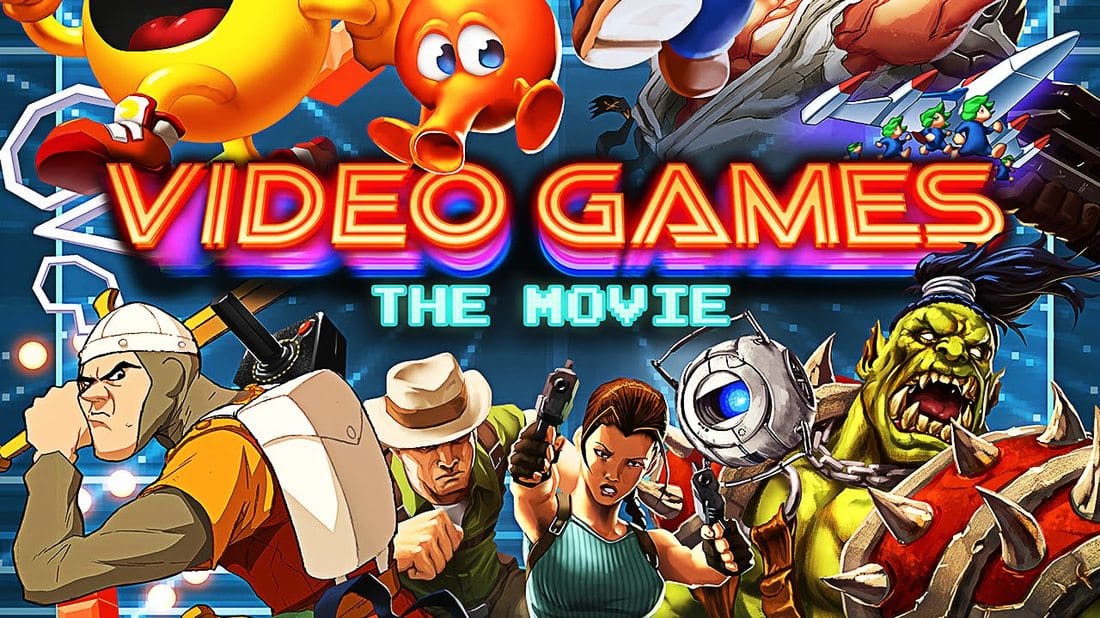3 out of 5 starsGenre: Documentary Run Time: 1 hour, 41 minutes, Not Rated Featuring: Sean Astin, Al Alcorn, Zach Braff, Nolan Bushnell, Donald Faison, Chris Hardwick, Chloe Dykstra, Hideo Kojima, Wil Wheaton Written & Directed by Jeremy Snead (feature-length film directorial debut) Any lover of video games will find themselves intrigued by the new documentary, Video Games: The Movie (available today On Demand and by download). But the film is not without several glitches, deciding to blindly celebrate all that is gaming instead of really breaking any new ground. We get it: It has become "cool" and more mainstream to be a video gamer, even though we are delivered this message in the film by several self-proclaimed dorks, geeks and nerdists (Chris Hardwick, of Nerdist.com and host of TV shows like The Talking Dead, is one of the film's talking heads). Video games are there own cultural phenomenon that will continue on as part of the fabric of human culture. For some reason, this documentary feels the need to defend that truth, to insist on the importance of video games while pointing out that not only should it be considered art, but that "good" video games are in truth more difficult to pull off than what is considered "good" in other mediums such as movies or music. But if you grew up with video games, as I did (and if you were born after the mid 1970s, there is a great chance that video games were or are a huge part of your life at some point), you will realize that this documentary is harmless. It is so pro-video games, to the point that it comes across as an in-house motivational propaganda video created and funded by the gaming industry itself (it is in fact, executive produced by Zach Braff, who also appears on-screen in the film talking about his love of games). It was actually funded as a project on KickStarter.com, so perhaps it was never intended as a thorough and deeper look into video game culture. This is never more prevalent than when - multiple times over the course of the film - it breaks into a montage of video game clips set to some hard rock anthems, as if the filmmaker himself couldn't quite focus his attention on anything but the impressively flashy graphics that now are commonplace in the video gaming world. As for narrative (with voice-over provided by actor Sean Astin), the film jumps all over the place. It comes across as untethered, uncontrollable excitement about its subject, but it is also dizzying and at times a bit confusing. Take for example, a sequence towards the beginning of the film, where an incredible amount of statistics are thrown our way on gaming, gamers and how mainstream everything has become. I could barely keep up with them and after hearing a percentage over and over in such a short span, I wasn't quite even sure I could recite a single fact that was discussed. The film is at its best when it delves into the history and origins of video games, as well as when it looks into its future. We learn about how the exact beginnings are still considered a bit muddy and how the first video game monitor was created with a game called "Space Wars." Typically, the lay-video-gamesman thinks of Pong as the first video game, but we learn in this doc that there was actually a pre-Pong era. Where the earlier statistics and percentages were splattered on the screen, the film then takes its time showing us a very easy-to-follow timeline of how console gaming has evolved, from "Space Wars" to Pong to the Atari, Nintendo, Genesis, X-Box and beyond. The suggestions of what is to come down the road even further was pretty compelling stuff as well. Anybody who even knows a trace amount of video game history knows that the phenomenon wasn't just America-centric. The film mostly leaves out any mention of how video gaming in other cutting-edge countries, like Japan, surely had a role to play. There is no mention whatsoever of the Famicom or the Super Famicom - the Japanese versions of the NES and Super Nintendo - and surely there would be in a documentary that paints a thoroughly global history of video games. The film also trips up when it addresses the ongoing debate of video games' influence or relation to violence. Without this argument in the film, Video Games: The Movie is accepted as a fanboyish celebration of all things video game-related. But with this argument shoe-horned in, it was somewhat maddening to anybody with an intellectual bone in their body. Any good documentary that makes an argument - on one side or the other of an issue - feels more effective the more points-of-view that are introduced. Here, there is not even one counter-point suggesting a video game/violence connection. In a documentary where violent scenes are shown over and over again, where moments earlier somebody says, "There is no more satisfaction than blowing your friend in half," the film gets somber for a few moments and brushes off any suggestion that there is a connection between real-life violence and video game violence. As one "expert" mentions, there is violence in movies too. It felt eerily similar - and flimsy - as the pro-gun debate that "guns don't kill people, people kill people." If you believe that, you probably will take Video Games: The Movie at its word when it tells you that is has no role in shaping violent culture, even though it praises their impact on every other part of American culture. But that argument is only a flashing moment of the documentary and is not what the film aims to be about. Video Games: The Movie honors the video game medium by mimicking the affect that they have on us: We are distracted, diverted and ultimately entertained. It's just a bit of a shame that this film is mostly preaching to the choir.
0 Comments
Leave a Reply. |
Looking for a specific movie or review?
Search Below: Categories
All
Archives
May 2024
|
tom santilli movie reviews
Tom Santilli is a professional film critic, TV personality, host and
the Executive Producer of Movie Show Plus.
He also is the featured film critic appearing on WXYZ Channel 7 Action News in Detroit,
and appeared weekly on FOX-2 in Detroit from 2016-2020.
Feel free to use the "search" below to find your favorite titles.
TOM'S GRADING SCALE:
B- and above: Thumbs Up
C+ or below: Thumbs Down
Currently Airing:Check Local Listings
|
For more information on Movie Show Plus, Email: |


 RSS Feed
RSS Feed
